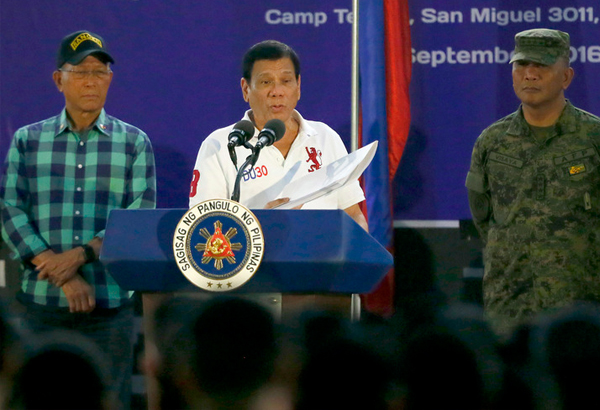MANILA, Philippines — President Rodrigo Duterte’s pronouncement about the possible suspension of the writ of habeas corpus is just an idea as far as Malacañang is concerned even as some sectors are worried that the move could lead to human rights violations.
“Is it effective already? What’s the question? The suspension of writ of habeas corpus is an idea that was floated,” Martin Andanar told radio station dzRB Sunday.
Asked what safeguards would be implemented to prevent the abuse of the suspension of the writ, Andanar said: “He (Duterte) has not announced the suspension of the writ of habeas corpus. It is just an idea.”
A writ of habeas corpus, which means “produce the body,” is an order to deliver or present the body of an imprisoned person. It allows a person to question or challenge an unlawful detention before a court.
Last Friday, Duterte said he might suspend the writ of habeas corpus if lawlessness spread in Mindanao. He said such move would strengthen his campaign against illegal drugs and rebellion.
“If lawlessness spread, I might be forced to. I really don’t like to. It’s my warning to all of them. I really don’t like it because it’s not good. But if you force my hand into it, I will declare the suspension of the writ of habeas corpus, not Martial Law,” the president said in a speech in Davao City.
“If you don’t give me a choice then you box me in a corner and I find myself helpless because it has been there. Those are really provisions intended to protect the Republic of the Philippines,” he added.
“I can be ordered by the Supreme Court to stop it but there are things that they cannot, and maybe, I will not stop. I will tell them I have to finish this first then I can go to jail.”
Article VII, Section 18 of the 1987 Constitution states that the suspension of the privilege of the writ of habeas corpus “shall apply only to persons judicially charged for rebellion or offenses inherent in, or directly connected with, invasion.”
“During the suspension of the privilege of the writ of habeas corpus, any person thus arrested or detained shall be judicially charged within three days, otherwise he shall be released,” the provision read.
Asked what factors would prompt Duterte to suspend the writ, Andanar said: “I do not want to preempt the president with regard to the conditions he would set if ever he would suspend the writ of habeas corpus for the fight against illegal drugs.”
Andanar claimed that the idea of suspending the writ is not an admission that the administration’s anti-drug campaign has failed. He noted that the president had sought a six-month extension to his six-month crackdown against narcotics.
“It does not mean that we have failed in our campaign against illegal drugs. It only means that the president discovered just now that our problem on illegal drugs is this rampant,” Andanar said.
“It’s that simple. It’s just calling a spade a spade,” he added.
Andanar claimed that the number of government personnel involved in illegal drugs is “beyond our expectation.”
“It is not an overnight campaign. It is not a campaign that can be done in just six months and the president has already mentioned that,” he said.
“The president is so worried already. He mentioned several times that he needs the help of everyone and he cannot do it alone.”
Last September, the president placed the country under a “state of emergency” following a blast in Davao City that left at least 14 persons dead and about 60 others wounded.
The declaration, which was contained in Proclamation No. 55, also directed the military and the police to “to undertake such measures as may be permitted by the Constitution and existing laws to suppress any and all forms of lawless violence in Mindanao and to prevent such lawless violence from spreading and escalating elsewhere in the Philippines, with due regard to the fundamental civil and political rights of our citizens.”
“The state of lawless violence was imposed to counter the bomb threats of terrorists. That's been effective in terms of thwarting terrorists’ plans and capturing the suspects,” Andanar said.


No comments:
Post a Comment